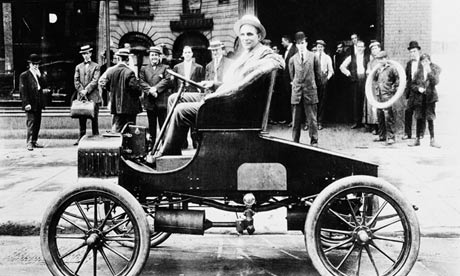There are strong economic reasons for a living wage. And even stronger moral ones

Henry Ford in one of his automobiles made during the early 1900's. He set a good example on paying a decent wage. Photograph: Superstock/Getty Images/SuperStock RM
News of a refreshingly different approach to business came from the low budget chain, Sports Direct. It is responsible for selling one in four pairs of trainers in the UK, a rise in sales of 45% since 2006. Mike Ashley, billionaire owner of the chain, has devised a staff bonus scheme that means 2,000 Sports Direct staff, some earning £20,000, will receive £100,000 each. Ashley has spoken volumes in the ongoing and ever more urgent debate about what constitutes a fair society and who gets what in Britain in wages, bonuses, profits and shareholders' dividends.
Ashley's action stands in sharp contrast to the decision of Network Rail's 44 members (the equivalent of shareholders) to give five senior executives, already on substantial salaries,a bonus of £2m if certain targets are met in 2015.
Manuel Cortes, general secretary of the Transport Salaried Staffs Association (TSSA), rightly describes this as "rewarding failure".
"These bosses will be on board a very lucrative gravy train," he is reported as saying, "while the poor passengers pay through the nose with annual above-inflation fare rises."
As a recent report by the Joseph Rowntree Foundation (JRF), points out, it isn't just fares that are rising. The average family is in a vice. The minimum cost of living has soared by 25% in the past five years as wages have flatlined. Childcare costs are up by 37%, energy costs by 39% and food costs have increased by 24%, with an even greater hike still to come, according to Philip Clarke, chief executive of Tesco, speaking to the Observer yesterday.
Now, to reach an adequate standard of living, JRF says that a lone parent requires £25,600 a year and a working couple with two children need £19,400 each. The freeze in child benefit, the decision to uprate tax credits by just 1% and the increase in the cost of essentials faster than inflation means that a working couple with two children will be £230 a year worse off. That may not seem much to those fortunate enough to earn significantly more than the median salary of £21,583 but a person on a minimum wage working 40 hours a week, receives less than £13,000 a year.
These families are also about to navigate several weeks of school holidays. Perpetual struggle itself exacts a price. Donald Hirsch, author of the JRF report, says: "There is a growing gulf between public expectations of the living standard everyone should be able to afford and their ability to earn enough to achieve it." That is grossly unjust. It is also economically unsound.
As John Sentamu, the archbishop of York, argues on these pages: "The scale of low pay in Britain is a national scandal." Five million people – 3 million of them women – and four out of five working in the private sector, receive pay so low they are subsidised by £4bn a year from the taxpayers' purse. "Why aren't those who are profiting from their workers paying up?" the archbishop rightly asks. "Why is government having to subsidise businesses who don't pay their employees enough to live on?"
In a search for some of the answers, the Living Wage Commission, created by the left-of-centre organisation Compass, has established a year-long investigation into the future of the living wage, its value and the barriers to its implementation, to report in 2014, chaired by the archbishop. It is timed to influence the manifestos of the political parties in the 2015 general election. The Observer welcomes the inquiry. Since last year, it has published a series of articles on the working poor that have received a remarkable response from readers, so it concurs with the archbishop of York when he says: "We need to have a national conversation about low pay in Britain."
The voluntary living wage is set at £8.55 an hour in London and £7.45 in the rest of the UK. The statutory minimum wage is set at £6.19 an hour for those over 21, due to rise by 12 pence in October. For well over a decade, the charity Citizens UK has led the campaign that now means almost 300 companies pay the living wage to more than 45,000.
Supporters are recruited from across the political spectrum, including Boris Johnson, Ed Miliband and Alex Salmond, as well as leaders of most of the faiths. Justin Welby, the archbishop of Canterbury, says: "It's something we should be shouting about."
The Catholic bishops have also asserted: "Fair wages are essential to the common good of society."
The moral argument is strong, but so, too, are the economic drivers. Henry Ford paid his workers $5 a day not so they could buy his motor cars but to retain staff, reduce absenteeism, improve motivation and control training budgets.
According to JRF, child poverty costs taxpayers £25bn a year despite the fact that 57% of children in poverty have at least one working parent. Research by the thinktanks IPPRand the Resolution Foundation suggests that in many sectors, the cost of the living wage would be minimal. Banking, construction and computing companies, for instance, would see roughly 1% added to their wage bill; even the retail sector would see only a 5% rise.
We are on a precipice. Household debt, according to Aviva Family Finance, has risen by 40% in 12 months. As the Resolution Foundation has warned, a rise in interest rates could tip more than a million families into the abyss and still the number of children slipping into poverty continues to increase.
The living wage is by no means the entire answer but it is a vital strengthening of the safety net. Instead, according to JRF, the new benefit, universal credit, is likely to make the economic situation for many working families worse, not better.
As Jeremy Warner, assistant editor of the Daily Telegraph, has pointed out: "This is not the way capitalism is meant to work." He adds: "The division of spoils has reached a level that, if unaddressed, threatens to be dangerously destabilising, socially and politically."
There are strong economic reasons for a living wage. And there are even stronger moral ones. It is unjust that workers at the bottom of this country's pay scale suffer so egregiously while executives, CEOs and shareholders help themselves to a disproportionate share of the spoils.
These spoils are often built on the back of the lowest paid workers. This is unjust and unfair. And, ultimately, that unfairness will build tensions and frictions that will become unbearable. A strong and healthy society is one where everyone feels appreciated and fairly remunerated. A living wage would benefit us all in creating a stronger and happier nation.

No comments:
Post a Comment